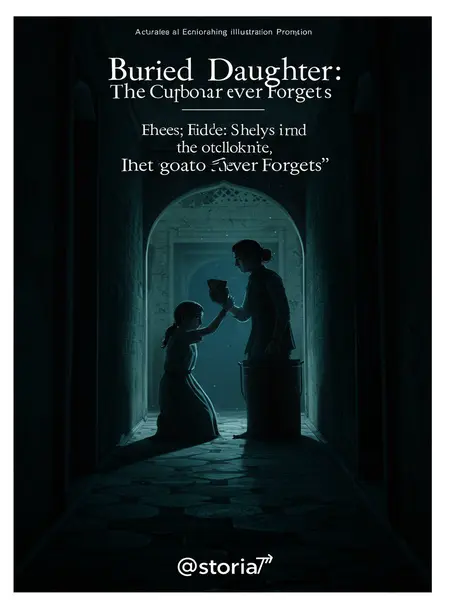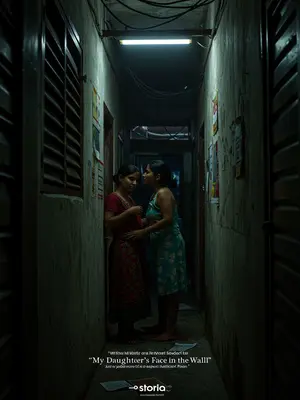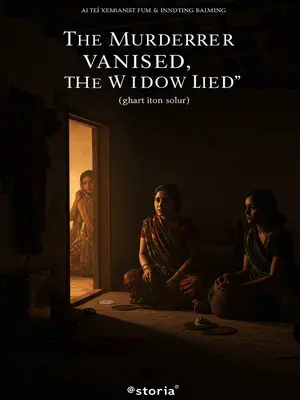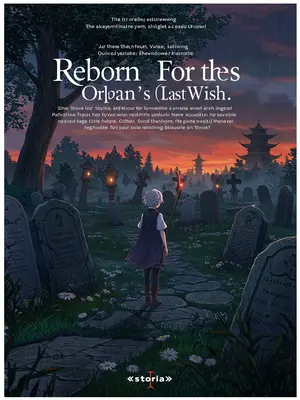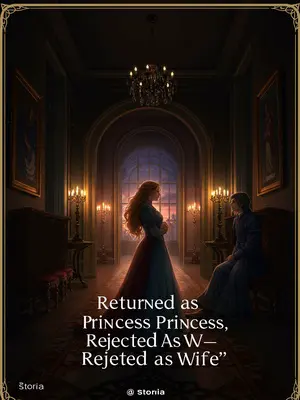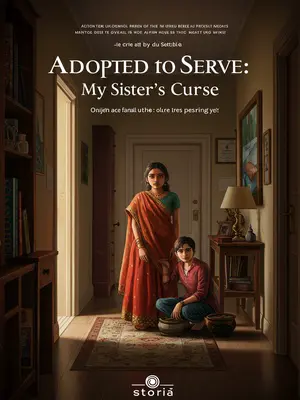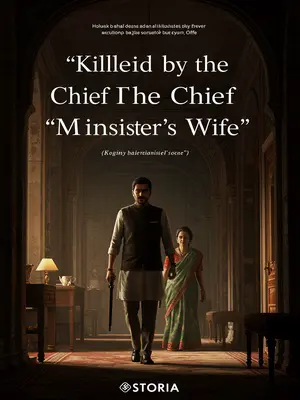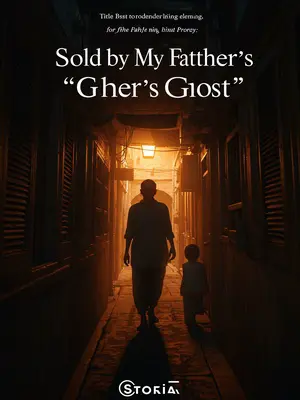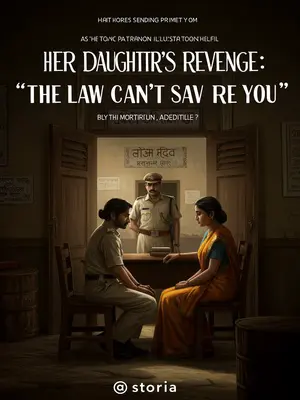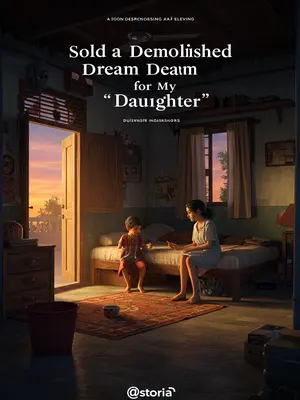Chapter 2: The Ghosts of Childhood
Our daughter's name was Kiran, though at home we called her Kittu.
She was the sparkle of our lives—her laughter ringing out like temple bells. She loved dancing in the courtyard when the first monsoon rain fell, arms stretched wide to catch every drop. Even now, I sometimes imagine her small fingers poking me awake on Sunday mornings, demanding chai and a story.
If she were alive today, she’d be twenty-eight.
I wonder what she might have become—maybe a teacher at Lucknow University, or a woman in cotton kurtas, her hair braided in the mornings by Meena. Every time I saw a young woman in the bazaar, the ache in my chest reminded me what I’d lost.
When Kittu was eight, Meena and I decided to move to Mumbai for work.
Everyone in our colony had a Bombay story—city of dreams, they said. We dreamed of a flat with running water, maybe a TV that worked. But uprooting both children weighed on me at night.
It's not easy for small-town people to survive in Mumbai, and taking two children would have been a big burden.
We did the maths—train tickets, rent, school fees. My friends warned me, "Arre bhai, Mumbai mein bachchon ko sambhalna mushkil hai, especially ladki ko." Meena, always practical, agreed. "We’ll send money back. It’s only for a while," she said, but her eyes betrayed her worry.
The night before we left, Meena said she didn’t want to take Kiran—only our seven-year-old son.
I was stunned. Yes, the city was tough, but leaving a child behind? Meena’s tone was steel, her mind made up. She packed only our son’s clothes, leaving Kiran’s neat dresses and schoolbooks untouched on the bed.
My parents were gone, so there were no grandparents. If we didn’t take Kiran, there would be no one to look after her.
I reminded Meena, but she brushed it off. "We’ll manage. Ladkiyan majboot hoti hain," she said, not sounding convinced. The absence of grandparents always made our house feel emptier.
"Koi zarurat nahi. Ghar band kar do, sab kuch bhool jao. Jaisi hai, waise hi rehne do."
Her words hit me like a slap. My mouth went dry. I never imagined Meena—my Meena—could sound so cold. She spoke as if it was just another chore.
Her words shocked me to the core.
I stood frozen, unable to speak. For a moment, I didn’t recognize the woman before me—the mother of my children.
She didn’t care. "Kya naya hai ismein? Hamare mohalla mein kitni ladkiyan paida hote hi chhod di jaati hain. Humne toh Kiran ko saat saal tak pala hai. Wahi kaafi hai."
Her voice was bitter, almost mocking. In our neighbourhood, stories of abandoned girls were common. But hearing my own wife say it broke something inside me.
"But—"
I tried to argue, voice cracking, but Meena cut me off with a wave of her hand. "Bas karo na," she snapped, final and unyielding. It was the same tone she used with the sabziwala, but this time it was aimed at me. I felt like a scolded child.
"Bas karo na. Maan lo. Kal bataungi kya karna hai."
She straightened her saree, chin up, eyes blazing. When Meena decided something, there was no changing her mind. I swallowed my protests, guilt and fear churning in my gut.
Everyone knew she favoured our son and was stubborn.
It was an old family joke—extra ghee for his dal, new shoes every festival. Kiran noticed too, her eyes lingering on her brother’s plate, but she never complained. Now the old injustice returned, sharper than ever.
The next day, we packed as usual.
Suitcases zipped, furniture scraped, Kiran’s laughter floated as she tried to squeeze her soft toy into the smallest bag. Meena barked orders, her bangles clinking, the air heavy with naphthalene and dust.
Kiran and her brother ran around, eager to pack their toys.
Kiran giggled, sneaking dolls into her bag. My son tugged at my shirt, waving his new Spiderman tiffin, eager for Mumbai. Their innocence made my heart ache.
Meena gave me a look when the time was right.
She didn’t have to speak—the sharp, commanding glance was enough. She checked her watch, straightened her saree, and nodded. My heart pounded as I braced myself.
I hesitated, but walked up to Kiran.
My feet felt like stone. She looked up, eyes full of trust. For a moment, I almost turned back. But Meena’s gaze hardened, pushing me forward.
"Kiran, papa is tired from packing. Let’s play hide-and-seek."
I tried to sound cheerful. Kiran eyed me suspiciously, fiddling with her braid, wanting to pack instead. I knelt, cajoling her, but she wasn’t convinced.
She muttered, "I don’t want to play. I want to pack."
Her lower lip jutted out in a pout. I tried to coax her, but she clung to her suitcase.
At that moment, her brother piped up: "Didi, play with me!"
He tugged her arm, pleading. Kiran never said no to him. She looked at me, then at him, her resolve weakening. My guilt burned.
I rarely played with them; my son was eager for my attention.
I forced a laugh, patting his back. It was rare for me to join their games—today, my own trust was my weapon.
With her brother’s insistence, Kiran finally agreed.
She sighed, rolling her eyes, but a smile tugged at her lips. She always protected him, stronger than any adult. My heart twisted.
So I pretended to play with them for a while.
We darted through rooms, laughter bouncing off the walls, masking my dread. Meena watched, arms folded, lips tight. I tried to burn every second into memory, knowing it would be the last.
Until Meena signalled—packing was done.
She cleared her throat, suitcase wheels clattering. I looked at her, then at Kiran, heart hammering.
I knew it was time.
I swallowed hard, hands trembling. The weight of what I was about to do nearly crushed me.
"Last round. Didi hides. Your brother and I will find you. Kiran, hide well!"
I tried to sound playful. Kiran’s eyes lit up at the challenge, her competitive streak taking over. My son clapped.
Meena joined in: "I know a great hiding place. Kiran, come, mummy will take you."
She knelt, voice sweet as honey, leading Kiran toward the storeroom. She shot me a look—this is the only way. The corridor stretched endlessly as they disappeared.
Meena led Kiran toward the storeroom.
The bulb flickered as they walked, shadows long on the cracked floor. Kiran looked back, eyes full of trust. I forced a smile, tears pricking my eyes.
Only Meena and I knew about the basement below.
It was our family’s secret, dug by my dadaji for storing grain. Now it was for forgotten things—old trunks, moth-eaten blankets, broken toys. No one went down unless they had to.
The basement, once for famine grain, was now abandoned.
As a child, I played there, the cold stone floor underfoot, the air always damp. Over the years, spiders claimed the corners, secrets settled in the shadows.
Inside was an old iron cupboard, there since my childhood.
Its paint chipped and rusted, hinges groaning. The smell of metal and dust clung to it. Dadaji called it unbreakable—a fortress for secrets. Now, it would become Kiran’s tomb.
It was massive—three or four people to move it. The lock was old, its key as big as my palm.
We tried moving it once for Diwali, but even three men struggled. The lock was ancient, the kind from old Hindi films.
When Meena took Kiran down, I saw she was carrying a lock.
She held it close, metal cold in her grip. Kiran skipped beside her, clutching her doll, oblivious. My heart thudded as the steps creaked.
Soon, Meena came up from the basement alone.
Her face was pale, hands shaking. She locked the basement door behind her with a final, echoing click. The silence in the house was unbearable.
Only she came up.
For a moment, I thought I heard Kiran’s voice from below—a faint, "Mummy?"—but Meena shook her head sharply, warning me to stay quiet. Guilt pressed on me like a stone.
That night, we went to the police station and claimed Kiran was missing.
Meena wore her plainest saree, eyes red. I rehearsed my lines: "She must have gone to the neighbour’s, inspector saab." Meena wailed, clutching my arm, while the constable scribbled, barely interested.
Back then, stories of missing girls were common. With Meena’s tears, no one suspected us.
The city was full of such tales—lost daughters, vanished. The inspector offered platitudes, promising to circulate her photo. No one asked too many questions. No one ever does for a girl.
Twenty years passed in a flash.
Seasons changed, cities changed, but that day never faded. Every Diwali, as I lit diyas, I wondered if Kiran’s soul would ever find peace. Meena drowned herself in work, our son grew up, and life moved on.
We visited the old house sometimes, but never spoke of it.
The house felt smaller, emptier each time. We never mentioned the basement, never glanced at its door. The silence grew thicker than the dust.
We never checked the basement.
It remained untouched—a mausoleum of our guilt. Even when repairs were needed, we found excuses. Some doors, once closed, should stay shut.
This time, for my son’s wedding, I had to go down.
I forced myself, courage failing me. Meena pressed the old key into my hand, her fingers cold, eyes full of dread. No more running.
"Pandit ne jo kaha suna na? The dead must get their rites. Maybe Kiran’s unrest is why the pandit sensed something. I’ll bury her in the ancestral grave—maybe then she’ll rest and leave our son’s marriage in peace."
My voice shook. Meena nodded, eyes red. We both knew this was our last chance for redemption—and for our son’s future.
"Theek hai, jao. Kuch bhi ho, shaadi ruk nahi sakti."
She pressed her hands together in silent prayer, lips moving, eyes closed. Family honour, society’s gaze—it was all on the line. I nodded, the key heavy in my palm.
